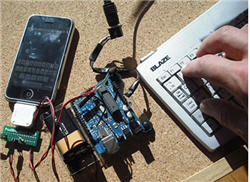
Ralph de la Vega, who runs the wireless and consumer arms of the company, spoke to attendees and reporters at a conference in New York held by financial services giant UBS. He said Dallas-based AT&T would offer “incentives,” rather than punishment, to get the top users to back down on their data use.
[aditude-amp id="flyingcarpet" targeting='{"env":"staging","page_type":"article","post_id":146008,"post_type":"story","post_chan":"none","tags":null,"ai":false,"category":"none","all_categories":"business,","session":"A"}']The top three percent are responsible for 40 percent of the data traveling through AT&T’s network, said De la Vega. “What we actually found out is customers didn’t know how they were using data,” he told the Wall Street Journal. “But once you alerted them to it, they actually reduce their consumption significantly.”
iPhone buyers can get an unlimited data plan from AT&T for as little as $69 per month base price. In fact, unlimited plans are the only kind AT&T currently sells. It makes the iPhone plus plan an attractive package, but AT&T has been unable to keep up with the resulting demand for data downloads and uploads. If De la Vega is correct, it might be easier than expected to keep AT&T’s data pipes from clogging again.
AI Weekly
The must-read newsletter for AI and Big Data industry written by Khari Johnson, Kyle Wiggers, and Seth Colaner.
Included with VentureBeat Insider and VentureBeat VIP memberships.
[Photo: AwghBlog, O’Reilly]
VentureBeat's mission is to be a digital town square for technical decision-makers to gain knowledge about transformative enterprise technology and transact. Learn More
